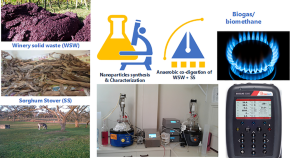Detection and quantitative microbial risk assessment of pathogenic Vibrio cholerae in a river used for drinking, domestic, fresh produce irrigation and recreational purposes
Authors (first, second and last of 6)

Collection
Water is a crucial resource; and its quality and availability constitute powerful determinants of sustainable health, economic growth and social development. Globally, water is a major challenge and there is need to explore the prime place of water towards the successful delivery of United Nation’s Sustainable Development Goals in sub-Saharan Africa.
Tackling today’s water-related challenges and expanding relevant frontiers demand a scientific approach and a collaborative convergence of the humanities, social sciences, and natural sciences. This topical collection on water sustainability in Africa is an interdisciplinary assemblage of research, responses, conversations, perspectives, and creative approaches to the water, health and climate nexus. It offers new ideas, African viewpoints, indigenous knowledge and local content in dealing with water challenges.
Keywords: Water, sanitation and hygiene (WASH); Drinking water treatment options; Aquatic environments and One Health; The arts and humanities for water and health; Water education, literacy and awareness; Water governance and resource management; Risks, vulnerability and resilience assessment; Water, Climate change and food security; Water, women and gender concerns; Wastewater treatment and bioenergy
Professor Chigor is an environmental and public health microbiologist experienced in engaging with communities to improve health outcomes and helping people understand the importance of water for every aspect of life.He established and still leads the multidisciplinary Water and Public Health Research Group at University of Nigeria,Nsukka, Nigeria and is the Convener of the International Conference on Water in Africa & Workshop on Water Testing in Rural Environments for Disease Control.Chigor’s PhD research assessed the water quality, incidence of enteric viruses and microbial risks in the Buffalo River in South Africa.
University of Nigeria, Nigeria Ikechukwu Erojikwe (PhD) is a performance and development strategist. He has applied the theatre for development approach in community engagement and water projects involving over ten communities in Nigeria. He is the Co-Leader of the Water and Public Health Research Group, University of Nigeria, Nsukka. He is interested in interdisciplinary research that involves water, gender, literacy, awareness and applied microbiology. He is a lecturer at the Department of Theatre and Film Studies, University of Nigeria, Nsukka.
Metcalf is a Professor Emeritus (California State University, Sacramento, where he taught microbiology courses from 1970-2012). He invented Portable Microbiology Laboratory, a game-changer for water testing. He also developed Cookit and Water Pasteurization Indicator that verifies reaching 65°C. He led water testing workshops (2008-2012) for UN-Habitat in Kenya, Tanzania, Uganda, Ethiopia and Rwanda, as UN-Habitat recognized the PML was ‘the missing link’ in water projects. He co-founded International Water and Health Alliances, that supports community-based organizations to implement a strategy to eliminate waterborne disease.
Dr Street is the Interim Director and a Senior Specialist Scientist at the Environment & Health Research Unit of the South African Medical Research Council, South Africa. Over the past decade, Dr Streets research has focused on various aspects of historical and emerging environmental contaminants of concern and the impact on human health. As a response to the COVID-19 pandemic, Dr Street was instrumental in setting up the SAMRCs wastewater surveillance and research Programme to monitor SARS-CoV-2 RNA trends.WSARP undertakes weekly surveillance across South Africa and collaborates with six partner laboratories.
Anthonia Ifeyinwa Achike is a Professor of Agricultural Economics and Agribusiness, with a PhD. She is a Laurette of two international Gender Institutes and has received cognate trainings in quantitative & qualitative economic data analysis.She has participated as a consultant and trainer in many development projects including Food Systems Analysis, Poverty, Gender evaluations and gender mainstreaming. Professor Achike is currently the Director of the Gender and Development Policy Centre of University of Nigeria Nsukka, Nigeria. She is a member of many professional bodies including the Water and Public Health Research Group.
Academie Nationale des Sciences et Techniques du Sénégal, Sénégal Prof Gaye is a retired Professor of Hydrogeology. He worked on secondment for 7 years (1999 -2006) at the International Atomic Energy Agency in Vienna (Austria) as isotope hydrology expert.He ended his professional career in 2016 as first Director General of Research at the Ministry of Higher Education and Research of Senegal.He is member of the National Academy of Sciences and Technology of Senegal and Chairperson of the Senegalese IHP Committee and Vice Chair of the Senegalese Academy of Sciences and Technology. He has authored more than 200 scientific publications.
Anna Mdee, a Professor of Politics of Global Development, is Associate Director water@leeds and Co-Director, Centre for Global Development at University of Leeds, UK. She also works with the Overseas Development Institute (ODI) as a Research Associate. An anthropologist, Prof. Mdee has worked primarily on Tanzania (for more than 20 years), but also have experience in Kenya, Nepal, Rwanda, South Africa, Uganda, Nigeria and Tajikistan. Her research focuses on the politics of global development and development practice, and on how to manage natural resources (primarily water), and how to reduce vulnerability through improved livelihoods.



